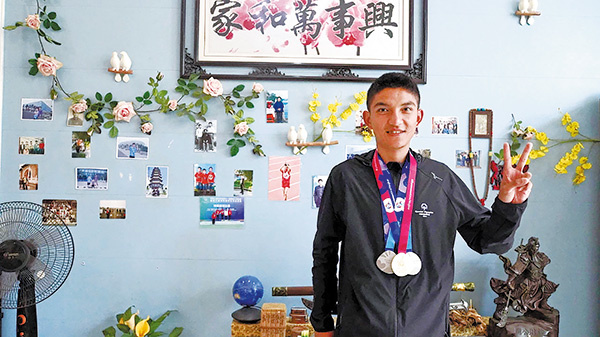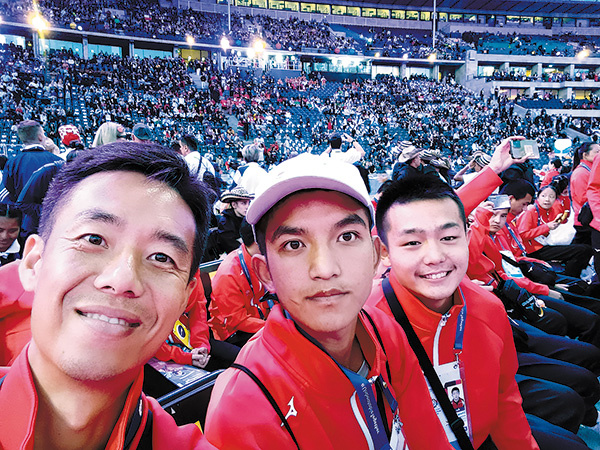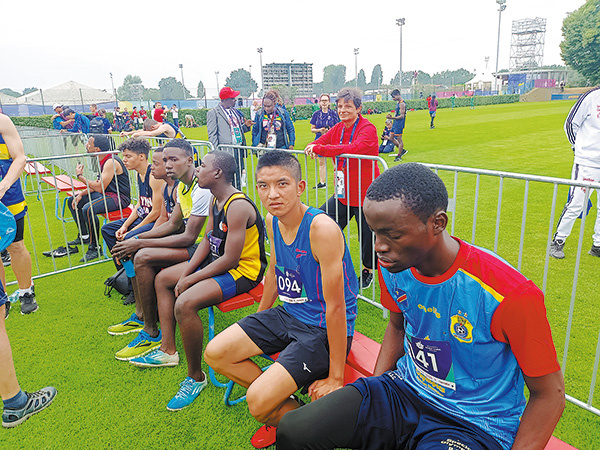
Lu Guowei posts for a picture wearing the three medals he won in the 2023 Special Olympics World Summer Games, held in Berlin, Germany, in June. [Photo provided to China Daily]
Editor's Note: Lu Guowei is shy and has problems speaking comfortably with strangers, so this story is built on interviews conducted with those closest to him.
"He is 21 years old but probably only has the intelligence of an 11-year-old child," said Lu Guoqiang, 23, referring to his younger brother Lu Guowei.
But this "child" won three medals in sprint running — one gold and two silver — in the 2023 Special Olympics World Summer Games, held in Berlin, Germany, from June 17 to 25.
The very next day, when Lu Guowei returned from Germany to his home in Yanshan, a small county in Southwest China's Yunnan province, he went to Yanshan Special Education School to see his former teachers, proudly wearing three of the medals he won at the Special Olympics, even though he already graduated from the school five years ago.
"All the students looked at him as if he was a hero, an icon," said Yang Jiaguo, a PE teacher at the school, adding that he himself was overwhelmed by excitement and pride. It was Yang who discovered Lu Guowei's talent in sprint running and led him onto this path in the first place.
Yang had no idea that this path would take Lu Guowei so far. After all, Lu Guowei's grandma first sent him to the school in 2013 just so that he had somewhere to go to after he dropped out of his previous school — a regular school — when both his family and teachers realized he was too slow to keep up. In fact, according to Lu Guoqiang, when they were younger, their mother left the family for the same reason — seeing the intellectually disabled Lu Guowei as a burden.
At the school, Yang introduced Lu Guowei to basketball. He noticed that Lu Guowei had excellent physical coordination, explosive power and jumping ability, which then led him to encourage Lu Guowei to try sprint running.
But what makes it hard is that Lu Guowei — like other intellectually disabled kids — has problems understanding even the simplest concepts and instructions, especially when he was younger. Yang remembered when Lu Guowei first started sprint training, he couldn't understand why each runner had to stay within one lane and shouldn't cut into someone else's.

Lu (middle) attends the opening ceremony of the Special Olympics with Zhu Xiang (left) on June 18.[Photo provided to China Daily]
"It was difficult for the concept to get through to him just by explaining it with words, so I would show him by asking him to tag along when I was running," Yang said.
But this very simple way of thinking may also be an advantage. "Guowei is a no-fuss athlete. He never makes excuses or complains," said Yang. "No matter how much I ask him to run, he'll just do it, even when I'm not watching."
Zhu Xiang, a PE teacher at Yuxi Special Education School in Yunnan, couldn't agree more. Before this year's Special Olympics, Lu Guowei and other track and field athletes went to Beijing to train for a month at the China Administration of Sports for Persons with Disabilities. As one of the team leaders, Zhu noted that the training time almost doubled during that month, but not one athlete complained.
"They are so innocent that they never overthink. They don't worry or fidget before the competition like normal people do. And even if they lose, they hardly dwell on it or feel regret," said Zhu. "They can fully enjoy the event."
Up until now, Lu Guowei has participated in six sports events — from prefecture level to provincial and national levels, and most recently, on the international stage in Germany. There, he pocketed the men's 4x400m relay gold medal and won silver in the 100m and 200m races. And in the 100m race, he lost out to the champion by a narrow margin of 0.17 seconds.
This is probably why special education schools like the ones Yang and Zhu work for have been dedicating themselves to students' athletic training. For example, apart from basketball and running, Yanshan Special Education School now also has a training program for roller-blading and will add in floor curling next semester.

Lu (second from right) waits with athletes from other countries to compete in the preliminary of the 200m race on June 19.[Photo provided to China Daily]
Yang said physical training might be the best way for these kids — with their intelligence below average — to make something of themselves.
"I always encourage my students to participate in competitions, not because I want them to win, but because I want them to see what the world is like out there — something they may never be able to do like normal kids if not for their sports training," he said.
However, it's still uncertain whether these kids can really fully grasp the concepts of "achievement" and "finding a purpose in life".
According to Lu Guoqiang, what has been driving his brother to win more games is not big dreams but simple wishes like using his award money to buy a new car for his uncle and aunt — who helped raise him as if he was their own.
Since the Berlin trip, it seems like nothing has changed. Lu Guowei spends his days exactly like before: walking his four dogs after he gets up in the morning, helping his aunt prepare the meals for the family, lending a hand at his uncle's car wash, and playing basketball for two and a half hours after dinner. "It's just like clockwork," said Lu Guoqiang. He is not sure what his younger brother will do in the future when he is older and passed his peak physical ability.
But to Zhu, sports surely change things for kids like Lu Guowei.
"I do notice that some of them become more confident and more outgoing after they join a sports team, where they spend time training together with others," he said. "It has a hugely positive impact on their mentality."
Yang once referred to special education as the "art of slowness" as changes happen very slowly with intellectually disabled kids.
However, changes do happen.